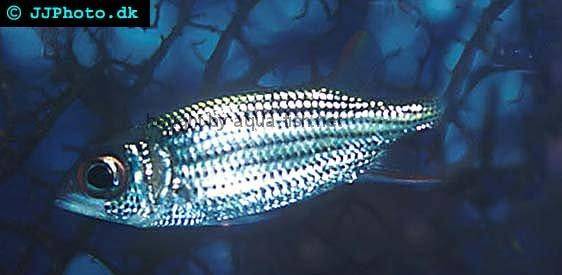Sammara Squirrelfish
This marine aquarium fish is known as Sammara Squirrelfish and the correct latin name is Neoniphon sammara. The family that this fish belongs to is called the Squirrelfish family. (e) Origin of this species is Indo-Pacific. (e)
Sammara Squirrelfish can grow up to 32 cm what is approximately 12 inches. So 1 specimen requires at least 3840cm2 of water surface which is approximately 595 square inch. This fish should be kept in aquariums that are large. (e) Medium aquariums have at least 113 Litres (30 US Gallons). Large aquariums have at least 265 Litres (70 US Gallons). Very large aquariums hold at least 700 Litres (185 US Gallons).
It is easy to keep the Sammara Squirrelfish. (e) The specific gravity (SG) should be between 1,020 and 1,025, the temperature between 23°C (73.4°F) and 26°C (78.8°F). The pH levels shouldn't be outside of 8.0 - 8.3 since most marine fish are used to the mentioned range of pH values.

Related fish profiles in the database
Feel free to share your experiences regarding keeping Neoniphon sammara below. Every message will be held for approval by our moderators. It usually takes 24 hours to publish your comment. Before you ask anything, browse the questions page, please.
Character and suggestions regarding care
A semi-aggressive Squirrelfish.Sammara Squirrelfish can grow up to 32 cm what is approximately 12 inches. So 1 specimen requires at least 3840cm2 of water surface which is approximately 595 square inch. This fish should be kept in aquariums that are large. (e) Medium aquariums have at least 113 Litres (30 US Gallons). Large aquariums have at least 265 Litres (70 US Gallons). Very large aquariums hold at least 700 Litres (185 US Gallons).
It is easy to keep the Sammara Squirrelfish. (e) The specific gravity (SG) should be between 1,020 and 1,025, the temperature between 23°C (73.4°F) and 26°C (78.8°F). The pH levels shouldn't be outside of 8.0 - 8.3 since most marine fish are used to the mentioned range of pH values.

Related fish profiles in the database
- Myripristis Berndti (Blotcheye Soldierfish)
- Myripristis Jacobus (Blackbar Soldierfish)
- Myripristis Kuntee (Shoulderbar Soldierfish)
- Myripristis Murdjan (Pinecone Soldierfish)
- Pristigenys Serrula (Popeye Catalufa)
- Sargocentron Cornutum (Threespot Squirrelfish)
- Sargocentron Spiniferum (Sabre Squirrelfish)
- Sargocentron Vexillarium (Dusky Squirrelfish)
- Sargocentron Xantherythrum (Hawaiian Squirrelfish)
- Saltwater aquarium heater
- Saltwater aquarium lights
- Saltwater aquarium filters
- Saltwater tank aeration
- Marine fish diseases
- Protein Simmers in the Saltwater Tank
- Setting up a Saltwater Tank
- Saltwater Fish Tanks
- Cleaner Shrimp
- Pajama Cardinals
- Banded Butterflyfish
- Black-Ray Goby
- Blue-Banded Goby
- Blue Chromis
- Blue Green Chromis
- Blue Spot Butterflyfish
- Breeding Seahorses
- Cleaning Goby
- Common Seahorse
- Domino Damselfish
- Dragonface Pipefish
- Drawf Seahorse
- Fire Goby
- Ghost Pipefish
- Golden Damselfish
- Humbug Damselfish
- Lemonpeel Dwarf Angelfish (Centropyge flavissima) Care
- Longfin Bannerfish
- Majestic Angelfish Care
- Neon Velvet Damselfish
- Northern Seahorse
- Pyramid Butterflyfish
- Spotted Watchman Goby
- Tips on Yellow Longnose Butterflyfish Care
- Two Spot Goby
- Yellow Longnose Butterflyfish
Feel free to share your experiences regarding keeping Neoniphon sammara below. Every message will be held for approval by our moderators. It usually takes 24 hours to publish your comment. Before you ask anything, browse the questions page, please.
Document modified on Wed Dec 19 10:31:11 UTC 2007
Document created on Wed Dec 19 10:31:11 UTC 2007
How to cite this page? Use the following HTML:
edit this page or create a new fish profile "Sammara Squirrelfish." saltwater.aqua-fish.net. Wed Dec 19 10:31:11 UTC 2007.
Aqua-Fish.Net. Sat Jul 19 0:11:35 UTC 2025 https://saltwater.aqua-fish.net/?sammara-squirrelfish.